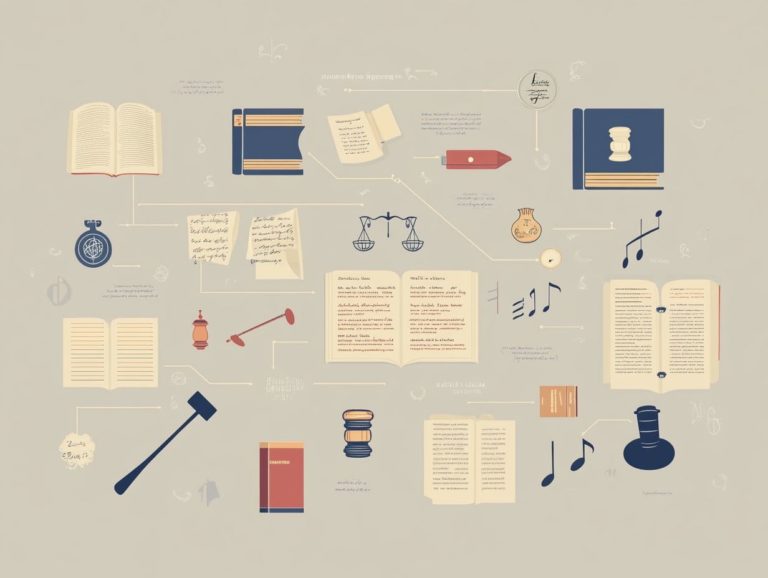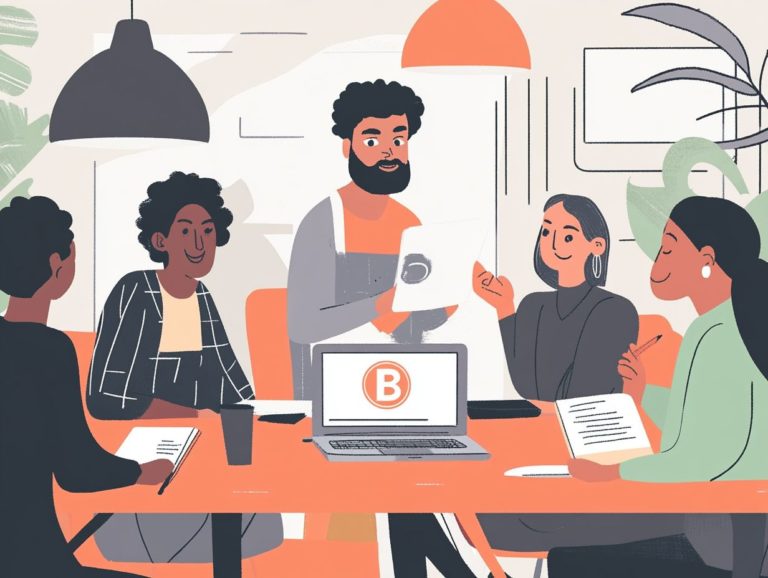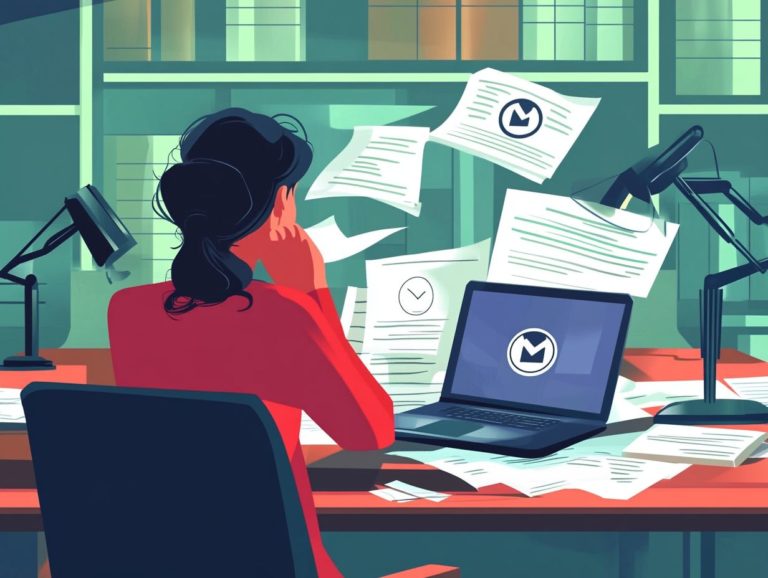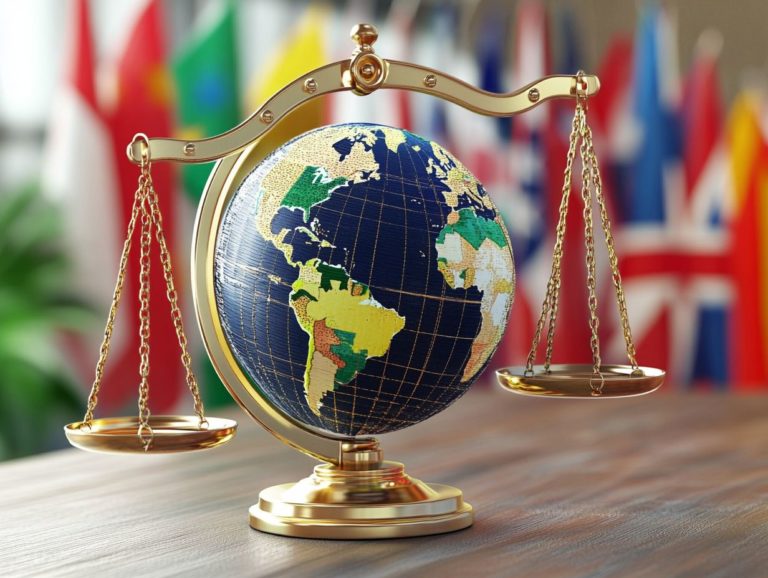The Connection Between Copyright and Patents
In today s fast-paced, innovation-driven world, protecting your creative work is essential for you as a creator, business leader, or inventor.
Copyrights and patents stand as two key pillars in this protection landscape, each serving distinct yet complementary roles. This article delves into the definitions, similarities, and differences between copyrights and patents, illuminating the types of creations they safeguard and the processes required to obtain them.
You ll discover their significance for businesses and what every creator should consider to effectively protect their work. Join us as we unravel the nuances of these vital legal concepts. This will prepare you to navigate this important aspect of your creative journey.
Contents
- Key Takeaways:
- Understanding Copyright and Patents
- Similarities between Copyright and Patents
- Differences between Copyright and Patents
- The Importance of Copyright and Patents in Business
- Understanding Copyright and Patents
- Frequently Asked Questions
- What is the connection between copyright and patents?
- How do copyright and patents differ from each other?
- Can a single creation or invention be protected by both copyright and patent?
- What are the benefits of obtaining copyright and patents for a creation or invention?
- Do copyright and patents have a limited duration of protection?
- What happens if someone infringes on a copyrighted or patented creation or invention?
Key Takeaways:
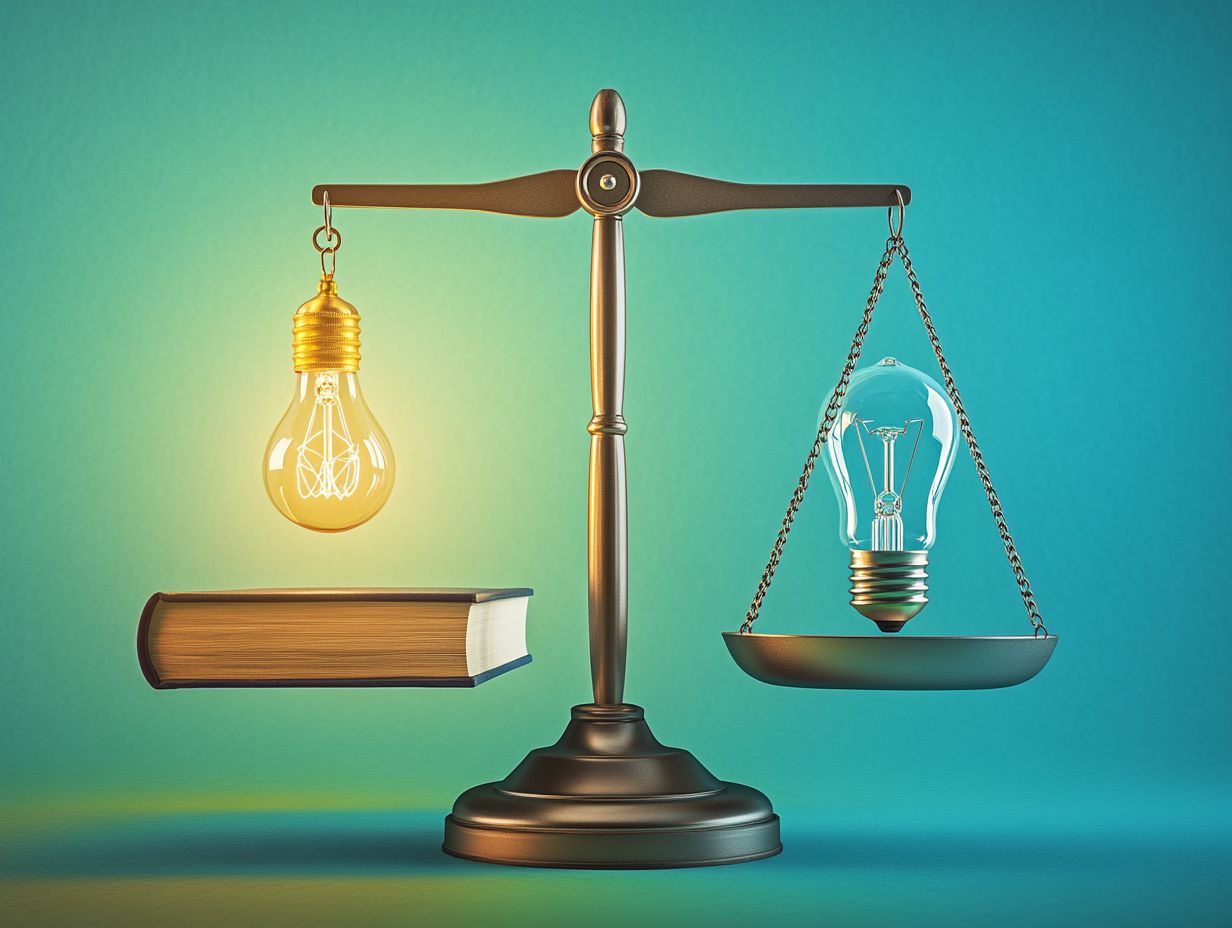
- Copyright and patents both protect your creative work, but they have distinct definitions and differences in terms of the types of creations they protect.
- Both copyright and patents require registration processes. However, the duration of protection and methods of enforcement and infringement differ between the two.
- The main importance of copyright and patents for businesses lies in the benefits they provide for creators and companies, as well as the considerations that business owners should keep in mind when dealing with their ideas.
Understanding Copyright and Patents
Understanding copyright and patents is essential for you as a business owner or creator in the United States. These legal frameworks provide crucial protection for your original works, unique inventions, and artistic creations.
Copyright law safeguards your rights, ensuring that your creative work isn’t exploited without your permission. On the other hand, a patent is a legal right that gives an inventor exclusive control over their invention.
The U.S. Copyright Office and the USPTO are government offices that help protect your rights. They work diligently to uphold and enforce these rights effectively.
Definitions and Differences
Copyright and patents are two essential pillars of protecting your creations, each designed for specific purposes and safeguarding unique types of works.
Copyright primarily shields original works of authorship think literary compositions, music, and visual art while patents protect inventions and processes that introduce a new and useful approach to doing things. Grasping these distinctions is vital for both creators and inventors.
Copyright gives artists the power to control how their ideas are expressed and utilized, allowing them to manage their work s usage. In contrast, patents grant inventors exclusive rights to their innovations, ensuring that no one else can make, use, or sell their patented creations without permission.
This framework fosters an environment where innovation and creativity can thrive across diverse fields.
Similarities between Copyright and Patents
Despite their distinctions, copyright and patents share key similarities that highlight their significance in safeguarding your creative work, much like the relationship between trade secrets and copyrights.
Understanding these parallels can deepen your appreciation for the mechanisms designed to protect your creative and inventive works.
Protection of Your Creative Work
The protection of your creative work through copyright and patents is crucial for ensuring that you maintain control over your original works and unique inventions.
These legal frameworks not only grant you exclusive rights to reproduce, distribute, and publicly display your creative endeavors but also give you the power to exclude others from making, using, or selling your inventions for a specified period. This legal protection fosters innovation across various sectors, including technology, entertainment, and pharmaceuticals, allowing you to reap the financial rewards of your contributions.
Beyond copyright and patents, trade secret law serves as an essential safeguard for your proprietary information, such as formulas, methods, or processes, helping you maintain a competitive edge in the marketplace.
Registration Processes
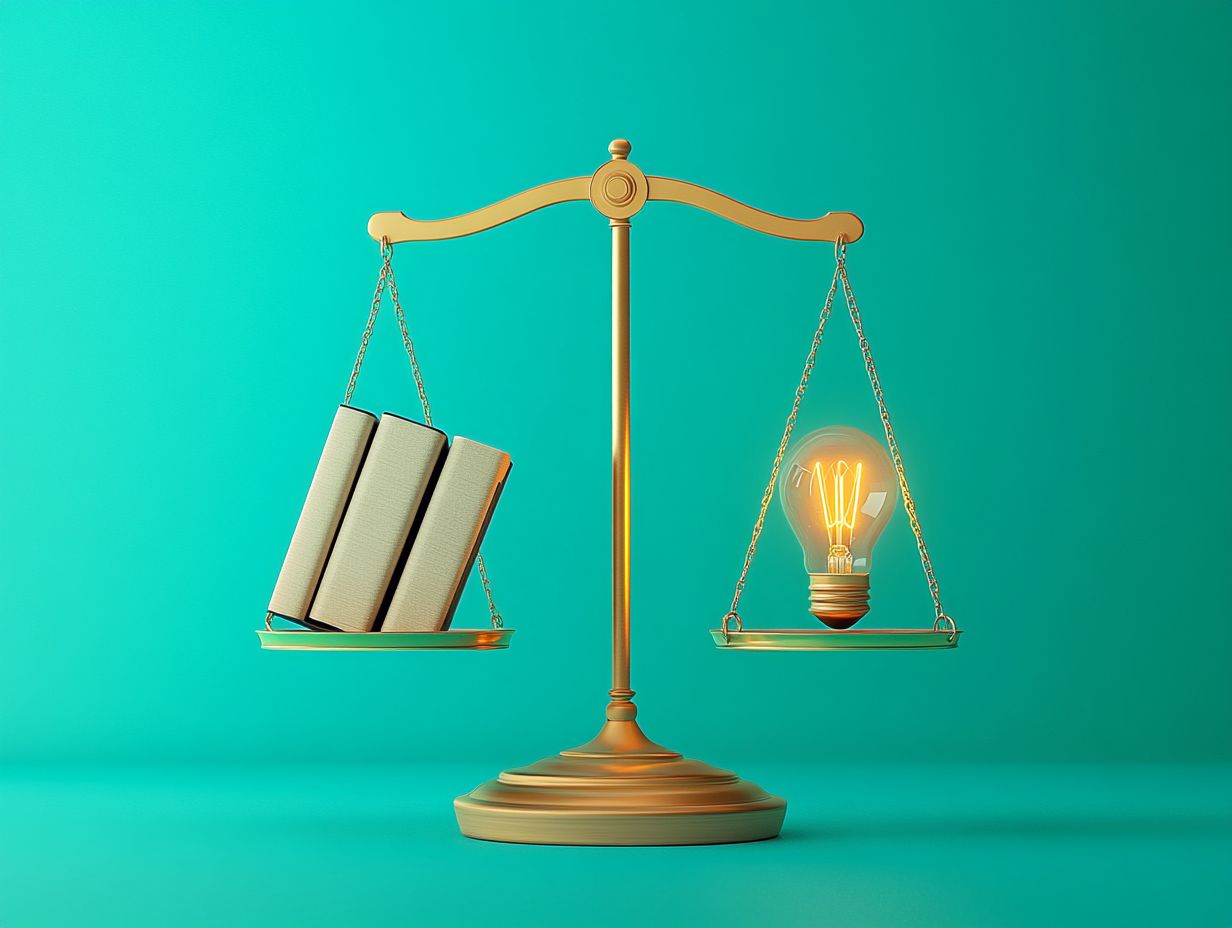
The registration processes for copyright and patents are markedly different, each agency serving a unique purpose in the realm of intellectual property protection. Understanding these procedures helps both creators and inventors.
When you pursue copyright, you typically begin by submitting a completed application form along with a copy of your work. It s vital to categorize your work accurately to prevent any unnecessary delays, as the U.S. Copyright Office conducts a thorough review of each submission.
In contrast, securing a patent involves navigating a more intricate application process through the USPTO. You need to include clear descriptions, specific claims, and often detailed drawings of your invention. Understanding these processes helps you protect your rights and provides legal options if infringement happens.
Differences between Copyright and Patents
Grasping the distinctions between copyright and patents, as well as understanding the connection between trademarks and copyrights, is essential for effectively navigating the intricate landscape of intellectual property.
This understanding will illuminate the types of creations that are protected and clarify the duration of that protection, empowering you to make informed decisions in your creative endeavors.
Types of Creations Protected
Copyright protects artistic works like novels, paintings, and software. Patents cover unique inventions, including processes and designs.
In the world of copyright, you ll encounter a diverse array of works from the novels and poetry that enrich our literary landscape to the visual arts that ignite inspiration. Even the code behind mobile apps is shielded, ensuring that your innovations as a developer are acknowledged and rewarded.
On the flip side, patents cover inventions across various fields, from groundbreaking pharmaceuticals that revolutionize healthcare to engineering wonders like advanced robotics and smart devices.
Remarkably, even design elements, such as distinctive product shapes and packaging, can be protected under patent law, highlighting the broad scope of these legal frameworks.
Duration of Protection
The duration of protection varies significantly between copyright and patents, shaping how you manage your intellectual property rights. Copyright typically lasts for your life plus an additional 70 years, providing a generous window during which your original works can generate revenue without the looming threat of infringement.
On the other hand, patents offer a more limited shield, usually lasting about 20 years from the filing date. This constraint compels you to strategize effectively. The stark difference in these timeframes can dictate not only how you approach innovation and investment but also influence your long-term sustainability plans.
As you consider the benefits of securing a patent versus opting for copyright, think about your market positioning. The implications for your competitive edge become increasingly significant.
Enforcement and Infringement
Enforcing copyright and patent rights is absolutely essential for you to prevent infringement and protect your intellectual property from unauthorized use. This process typically starts with identifying any unauthorized use, which may involve monitoring the market and using legal tools to ensure compliance.
Once you detect infringement, you have several options at your disposal, such as issuing cease-and-desist letters or pursuing legal action to reclaim your rights and seek damages.
Understanding the intricacies of laws that protect confidential business information is also crucial in this realm, as it offers a framework for safeguarding information that may not be eligible for patents or copyrights. By integrating these legal mechanisms, you can ensure a solid defense for your intellectual innovations while nurturing an environment where creativity flourishes.
The Importance of Copyright and Patents in Business
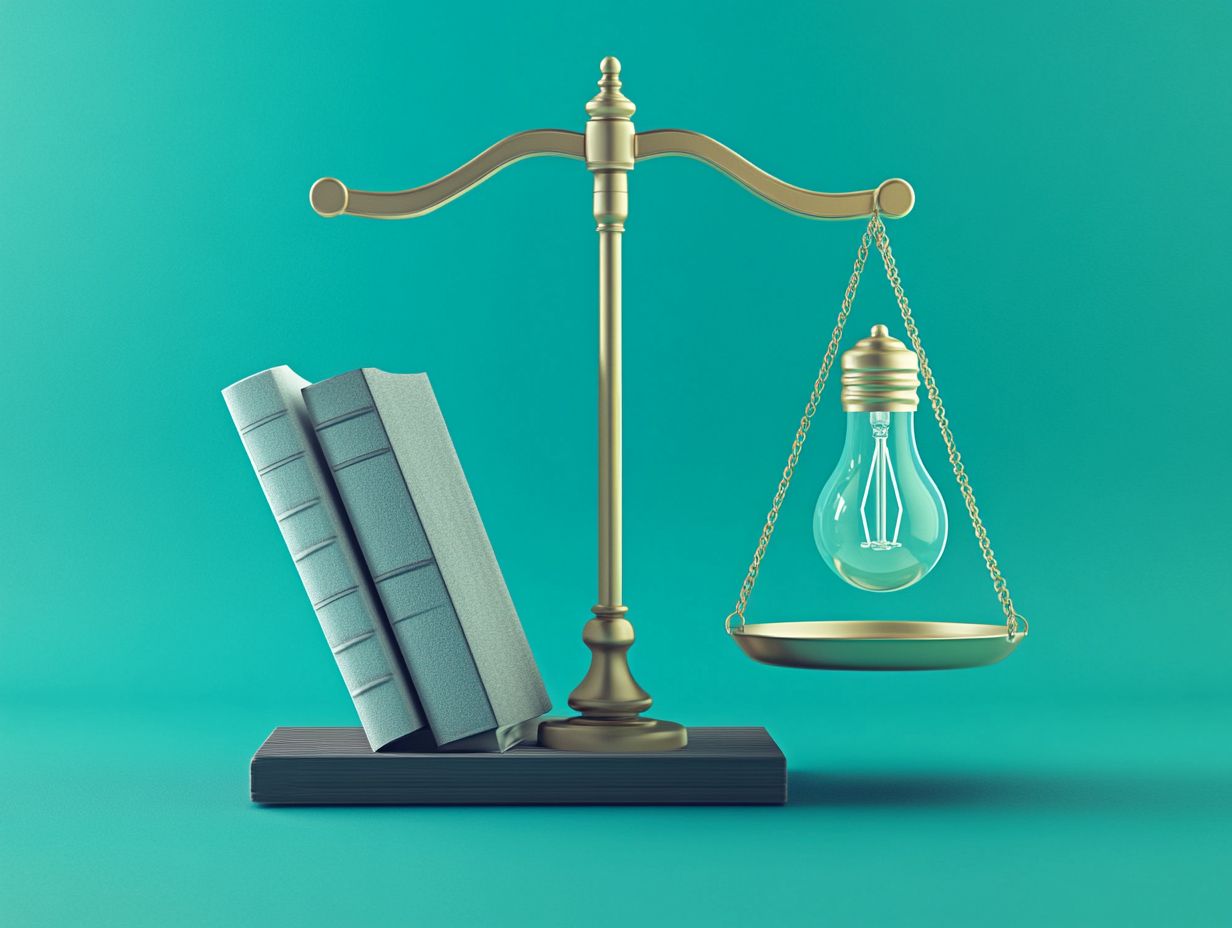
Copyright and patents are game-changers for businesses! The significance of these rights is paramount, offering vital protection for creative assets and innovations that play a crucial role in shaping a company s brand identity and driving economic success.
By securing these rights, you not only protect your ideas but also boost your business’s value!
Understanding Copyright and Patents
Copyright and patents are both forms of intellectual property protection that grant exclusive rights to creators or inventors. While copyright protects original works of expression, understanding the connection between licensing agreements and copyright is also crucial for navigating these protections effectively, as patents protect new and useful inventions.
Benefits for Creators and Companies
Copyright and patents offer significant economic advantages. They provide lucrative licensing opportunities and enhance your market position.
By securing exclusive rights, you can monetize your innovations. This transforms your ideas into valuable revenue streams and fuels creativity and long-term financial growth.
Holding patents or copyrights boosts your competitive edge. It makes you more appealing to investors and deters potential infringers, fostering an environment where innovation can thrive.
Key Considerations for Protecting Your Business
Understanding the world of copyright and patents requires careful consideration of strategies to safeguard your intellectual property.
Being aware of federal trademark registration is essential for establishing your brand’s identity and preventing unauthorized use by competitors. Recognize the various forms of intellectual property, as each offers different layers of protection.
Regularly monitor and enforce your rights to ensure ongoing protection and deter infringement. Stay informed about changes in legislation and industry standards. This knowledge gives you the power to take proactive measures toward safeguarding your creative assets, setting you up for long-term success in a competitive market.
Frequently Asked Questions
What is the connection between copyright and patents?
The connection between copyright and patents is that both are forms of intellectual property protection that grant exclusive rights to creators or inventors. However, they protect different types of creations or inventions. For a deeper understanding, you can explore the relationship between patents and copyrights; copyright mainly protects original works of expression, while patents protect new and useful inventions.
How do copyright and patents differ from each other?
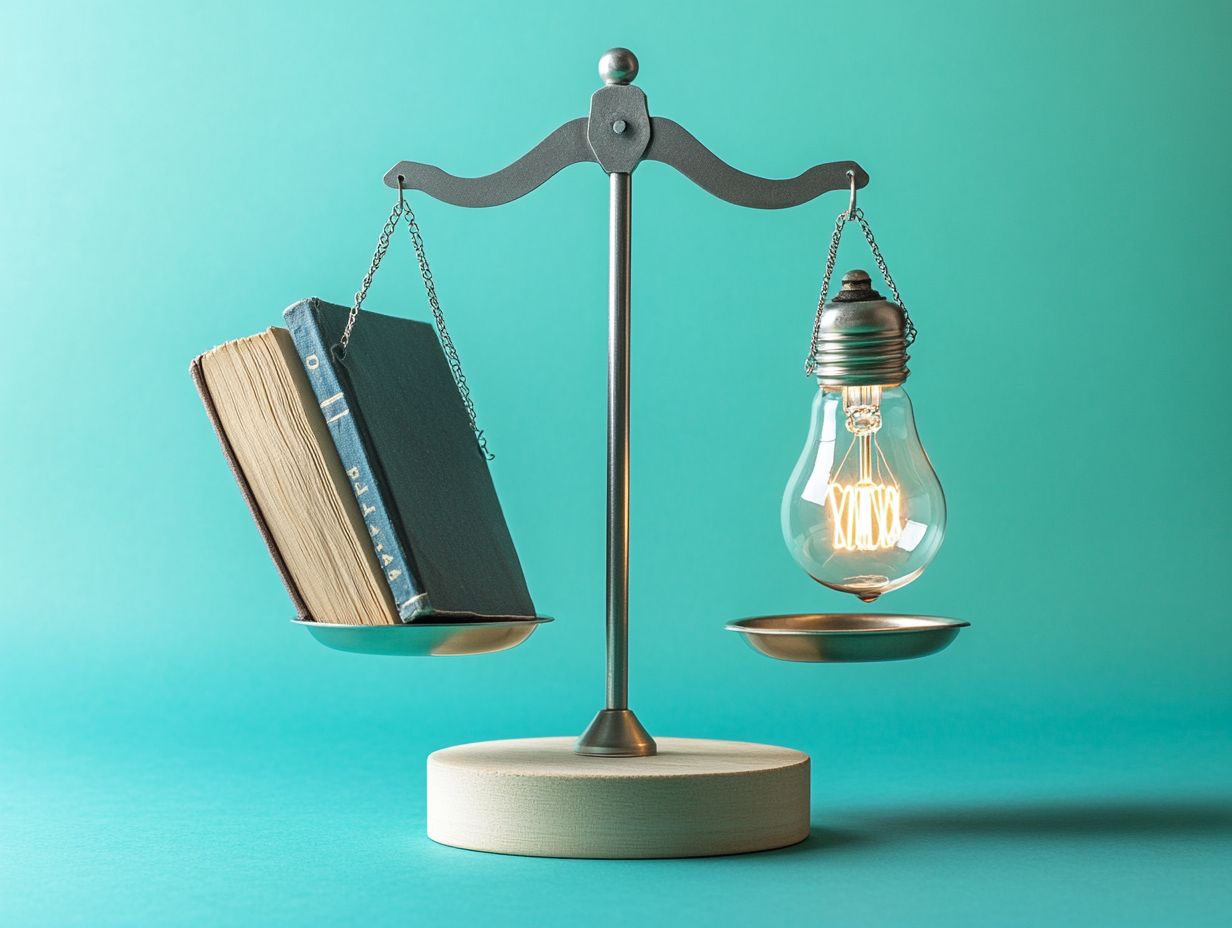
Copyright differs in its scope of protection and the types of creations it covers. It mainly protects the expression of ideas in literary, artistic, and musical works. On the other hand, patents protect the functional aspects of inventions, such as machines, processes, and designs.
Can a single creation or invention be protected by both copyright and patent?
Yes, a single creation or invention can be protected by both copyright and patent. For example, a new software program can be protected by copyright for its code and interface while also being patented for its unique and useful features or processes.
What are the benefits of obtaining copyright and patents for a creation or invention?
The main benefit of obtaining copyright and patents for a creation or invention is that it grants the creator or inventor exclusive rights. This means they have the sole right to reproduce, distribute, or profit from their creation, providing financial and legal protection.
Do copyright and patents have a limited duration of protection?
Yes, both copyright and patents have a limited duration of protection. The duration of copyright protection varies depending on the type of work and the country, but it typically lasts for the life of the creator plus a certain number of years after their death. Patents usually have a fixed duration of 20 years from the date of filing.
What happens if someone infringes on a copyrighted or patented creation or invention?
If someone infringes on a copyrighted or patented creation or invention, the owner can take legal action to enforce their rights. This may include seeking damages, an injunction to stop further infringement, or a license fee for unauthorized use.
If you have more questions or need further information about copyright and patents, feel free to reach out!



